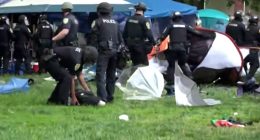
At one point in the latter half of Phoenix Rising, the two-part documentary focused on Evan Rachel Wood’s claims of sexual abuse by rocker Marilyn Manson that concludes on HBO on Wednesday, a group of alleged abuse survivors and former employees gather in a living room at an undisclosed location. Over the course of the meetup, some make claims of being locked in rooms, physically assaulted, raped and branded.
Filming for eight hours that day was director Amy Berg (An Open Secret, The Case Against Adnan Syed), who says there were more individuals at that meeting than those shown in the documentary, but some opted not to go on camera. As to whether any topics were off-limits that day, “there was no editing in the room,” Berg says. She adds that once people decided whether they wanted to be filmed or not, “everything else happened completely organically.”
Manson has long denied any and all abuse and assault claims. Earlier this month, Manson sued Wood for defamation, claiming that she and friend Illma Gore, who appears in the film, had created a “conspiracy” to share false allegations of abuse. (In an appearance on The View on Monday, Wood said she was “not scared” and that “the truth will come out and that this is clearly timed before the documentary.”)
The second part of Phoenix Rising follows Wood between 2020, after she testified in Sacramento in support of the Phoenix Act to extend the statute of limitations on domestic violence cases, and 2021, when she went public on Instagram with her claims that Manson abused her. During the film’s second part, she meets with other accusers and shares major claims against Manson, including that he raped her in her sleep and once tortured her with a whip.
In a response to Wood’s claims in Phoenix Rising and The View appearance, Manson’s attorney Howard King says in part, “As we detailed in our lawsuit, nothing that Evan Rachel Wood, Illma Gore or their hand-picked co-conspirators have said on this matter can be trusted. This is just more of the same.”
Berg says she doesn’t know much about that lawsuit.
The Hollywood Reporter previously spoke with Berg about the first part of the documentary. On Monday, in a follow-up interview about part two, the filmmaker addressed Wood’s suicide attempt, how she approached other accusers about appearing on-camera and how she sets about telling heavy, sensitive stories.
***
Why did you decide to split Phoenix Rising up into two parts, and what was the overall intention with the second part?
Well, it happened in the edit. We had a lot of material. Initially, as I discussed with you last time, this film was meant to be a film about Evan and the Phoenix Act and domestic violence and the legislation, and as her story got bigger and as the investigation got broader — meaning after she testified in Sacramento — she was contacted by a number of other survivors of the same abuser, and people were kind of reading the tea leaves and putting things together. So the story just kept getting bigger and bigger, and it was hard to just keep it to Evan’s story when there was so much else going on around her.
We got into edit, and we played with structure, and the backstory felt like a separate film than the current-day story, so that’s what the end decision was based on. The second part is pretty much our verité story, which starts at the end of the first act and goes forward from there, that’s our ongoing investigation and what we were following. But in order to get the audience to that place, we needed to tell a lot of backstory, and so that’s how it worked out.
This part includes several other alleged survivors of and former employees of Manson’s. What was the process like when it came to convincing those individuals to appear in the film?
Basically, Evan told us that she was going to be meeting up with survivors and offered us the opportunity to film that. We put signs on the wall and we checked in with everybody that showed up at the meeting. Certain people did not appear in the film, and then others did. There were certain people who were not ready to tell their story publicly yet, so we respected everyone’s boundaries, and we told the stories that were available to us.
Did folks in that meeting say that any particular topics were off-limits?
There was no editing in the room. It was basically that we knew who we could and couldn’t focus on, so that was how that worked. Everything else happened completely organically.
Speaking of weighty topics, in part two Evan also shares some very sensitive allegations, including experiences she’s said she’s had with rape, torture and a suicide attempt. How did you and Evan negotiate how you were going to speak about those topics?
We didn’t negotiate; Evan was an open book from start to finish with me, so there was no negotiation. It was about how the story played out and what mirrored the other stories. It was important for us to explain that she had attempted to take her own life, and that was the moment when she rose from the ashes, so to speak, and decided to fight back and have her life back.
How do you personally approach working on such heavy material?
I think it affected me more on this film because of the state of the world right now and being in a more insular environment rather than being in a room with my colleagues and having an office and people to share the brunt of it with. Everything was done over Zoom in terms of production meetings. So many things were happening just from my living room, so I think I had less of an outlet. I was in New York for a good part of this production, but getting to L.A. made it a little bit easier these last few months because I have better weather and nature to heal me a little bit.
But it is difficult. I always say that I’m trying to keep distance in the room from people, but it bleeds into you. I was listening to a neuroscientist on NPR a few weeks ago or months ago — he was just talking about how he was experimenting with a medicinal therapy, MDMA therapy, and he was talking about how he went under, and as he was in this altered state, he started seeing flashes of every patient he’s ever seen in his career, and students, and how it’s always lodged into the frontal lobe. It totally affected me because I was like, “Oh, my God, I can’t even imagine the stuff that’s in my brain right now.” But yeah, it’s tough. You have to find balance; you have to find a spiritual practice, which I have; you have to take time for your health and exercise and family and friends. This was more challenging than past projects — that’s my way of saying that. But yeah, it does seep in.
Evan talks a bit about renewing her relationship with Jamie Bell after she had finally separated from Manson in the film, and how it was difficult for her to talk about the abuse in that relationship. Did you ask Jamie to participate, and if so, what was his response?
I spoke to him early on and told him about what we were doing, but we didn’t really talk about interviewing him. I respected both of their privacy in that, so we didn’t. But he’s seen the film; I sent it to him.
Did he give you any thoughts back?
No, but he received it and watched it.
At one point in the film, Evan says that “her team” attempted to dissuade her from going public with her Manson allegations to protect her career. Did you go out for comment to particular team members, and did that surprise you at all, given what you know about the industry?
We were listening to the phone call, and we spoke with her team throughout the process, but that wasn’t the film that I was making. I didn’t really want to widen the lens too much; I didn’t really want to do a bunch of talking-head interviews. I just wanted to stay in Evan’s world — that’s the [story] I wanted to tell. So we spoke to all the survivors [in the aforementioned group meeting] when we were in the investigation and her direct family, but I didn’t really bring it out to the industry. I didn’t want to do that. [THR reached out for comment to Wood’s publicists and agent about these claims and did not receive a response.]
What was your reaction when Manson sued Evan for defamation earlier this month? Were you surprised in any way?
I don’t really know much about the lawsuit; that’s all I can really say. I don’t know anything more about that.
Has anything about the reception to Phoenix Rising surprised you or struck you as notable so far?
We got so much coverage, but nobody has seen the second half of the film except for the press right now, so I feel like it’s still early. It’s not until [Wednesday], so I’m really looking forward to that. Because right now everyone’s only seen half of the story. I can give you one answer — somebody called me and said something notable. A friend of mine who saw the first half at Sundance, a male friend of mine, called me after seeing the film and said he was so happy that he saw that because he said he felt he understood shame from a woman’s perspective for the first time. It was very educational for him, and I thought that was a great step towards [an] education of the dynamics that we’re talking about, especially in this film.
This interview has been edited for length and clarity.
Source: Hollywood





